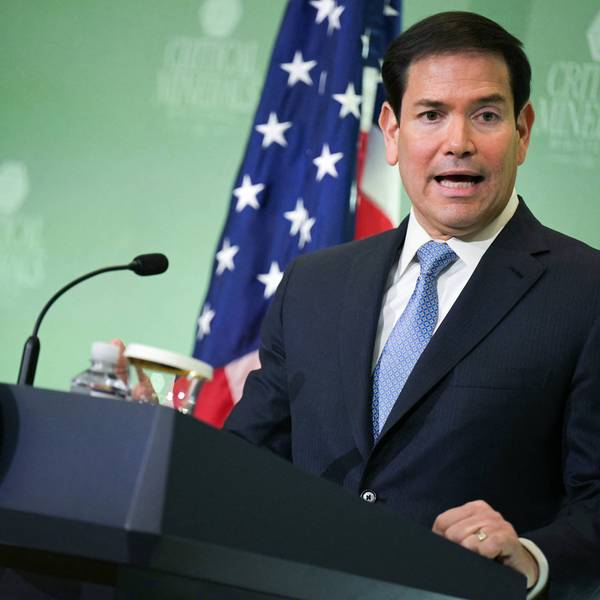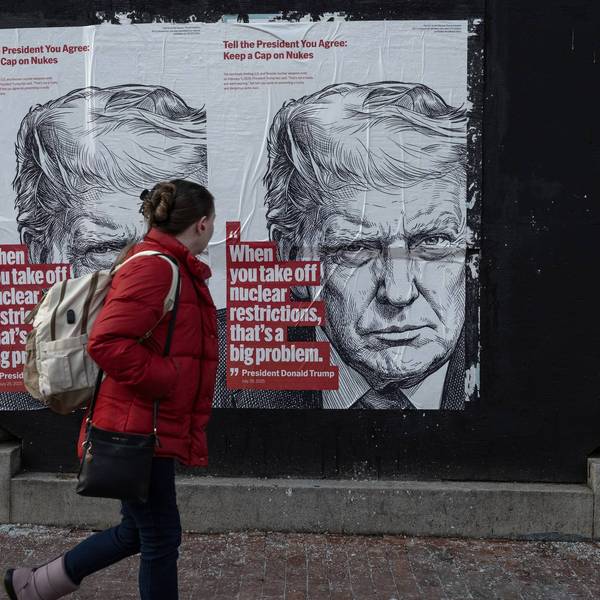
Peace activists stage a demonstration in Berlin on July 30, 2020. (Photo: Regine Ratke/IPPNW/CC BY-NC-SA 2.0)
Renewed Scrutiny of US Nuclear Weapons Stockpile as Campaigners Mark Day to Rid World of 'Tools of Mass Human Death and Suffering'
"There is no cure for a nuclear war. Prevention is our only option."
Global campaigners marked the International Day for the Total Elimination of Nuclear Weapons Saturday with renewed calls for disarmament and for all nations to join a United Nations treaty banning the weapons.
"The world continues to live in the shadow of nuclear catastrophe," U.N. Secretary-General Antonio Guterres said in a Friday statement commemorating the day. The "dangers posed by nuclear weapons are becoming more acute," he added.
"The only guarantee against the use of these abhorrent weapons," said Guterres, "is their total elimination."
The U.N. chief's call caps a week begun with an open letter from dozens of former global leaders and officials of U.S. allies urging all states to join the Treaty on the Prohibition of Nuclear Weapons, an agreement reached in 2017 but not yet in force because it has only 45 states parties--five short of what is needed.
The nine nuclear-armed states--China, France, India, Israel, North Korea, Pakistan, Russia, the U.K., and the U.S.--are not signatories.
The former global leaders, in their open letter, warn of the increased risk of nuclear detonation and say they must speak out against "allies who cling to these weapons of mass destruction."
"It is not difficult to foresee how the bellicose rhetoric and poor judgment of leaders in nuclear-armed nations might result in a calamity affecting all nations and peoples," they wrote.
The letter describes the 2017 prohibition treaty as "a beacon of hope in a time of darkness."
"There is no cure for a nuclear war," the letter adds. "Prevention is our only option."
The International Campaign to Abolish Nuclear Weapons (ICAN), which won the Nobel Peace Prize in 2017 "for its work to draw attention to the catastrophic humanitarian consequences of any use of nuclear weapons and for its ground-breaking efforts to achieve a treaty-based prohibition of such weapons," took to social media Saturday to highlight what the group said are "three inspiring facts that prove that we *can* eliminate [nuclear weapons]."
In a blog post Saturday, Japan-native Michelle Fujii, who works as program assistant for nuclear disarmament and Pentagon spending at advocacy group FCNL, described how her "family--those who were not killed by the U.S. atomic bombings--collectively survived not one but two nuclear weapon attacks, the only ones in history."
She further lamented that
there are still over 13,000 nuclear warheads in the world, with the United States possessing 5,800 of them. Congress plans to spend $35 billion in U.S. taxes every year for the next decade on our nuclear forces, and upgrading these weapons is eventually expected to cost $1.2 trillion. Meanwhile, debates rage over how to fund Covid-19 relief, universal healthcare, and climate action. [...]
Our entire national security strategy hinges on threatening other countries with nuclear annihilation, shortchanging and undermining our efforts in diplomacy and peacebuilding. And members of Congress continue to frame these weapons in terms of innovation and deterrence, instead of calling them what they are: tools of mass human death and suffering.
"We know the devastating human, cultural, and environmental impacts of nuclear weapons," wrote Fujii. "It is time for our money and policies to reflect this reality."
An Urgent Message From Our Co-Founder
Dear Common Dreams reader, The U.S. is on a fast track to authoritarianism like nothing I've ever seen. Meanwhile, corporate news outlets are utterly capitulating to Trump, twisting their coverage to avoid drawing his ire while lining up to stuff cash in his pockets. That's why I believe that Common Dreams is doing the best and most consequential reporting that we've ever done. Our small but mighty team is a progressive reporting powerhouse, covering the news every day that the corporate media never will. Our mission has always been simple: To inform. To inspire. And to ignite change for the common good. Now here's the key piece that I want all our readers to understand: None of this would be possible without your financial support. That's not just some fundraising cliche. It's the absolute and literal truth. We don't accept corporate advertising and never will. We don't have a paywall because we don't think people should be blocked from critical news based on their ability to pay. Everything we do is funded by the donations of readers like you. Will you donate now to help power the nonprofit, independent reporting of Common Dreams? Thank you for being a vital member of our community. Together, we can keep independent journalism alive when it’s needed most. - Craig Brown, Co-founder |
Global campaigners marked the International Day for the Total Elimination of Nuclear Weapons Saturday with renewed calls for disarmament and for all nations to join a United Nations treaty banning the weapons.
"The world continues to live in the shadow of nuclear catastrophe," U.N. Secretary-General Antonio Guterres said in a Friday statement commemorating the day. The "dangers posed by nuclear weapons are becoming more acute," he added.
"The only guarantee against the use of these abhorrent weapons," said Guterres, "is their total elimination."
The U.N. chief's call caps a week begun with an open letter from dozens of former global leaders and officials of U.S. allies urging all states to join the Treaty on the Prohibition of Nuclear Weapons, an agreement reached in 2017 but not yet in force because it has only 45 states parties--five short of what is needed.
The nine nuclear-armed states--China, France, India, Israel, North Korea, Pakistan, Russia, the U.K., and the U.S.--are not signatories.
The former global leaders, in their open letter, warn of the increased risk of nuclear detonation and say they must speak out against "allies who cling to these weapons of mass destruction."
"It is not difficult to foresee how the bellicose rhetoric and poor judgment of leaders in nuclear-armed nations might result in a calamity affecting all nations and peoples," they wrote.
The letter describes the 2017 prohibition treaty as "a beacon of hope in a time of darkness."
"There is no cure for a nuclear war," the letter adds. "Prevention is our only option."
The International Campaign to Abolish Nuclear Weapons (ICAN), which won the Nobel Peace Prize in 2017 "for its work to draw attention to the catastrophic humanitarian consequences of any use of nuclear weapons and for its ground-breaking efforts to achieve a treaty-based prohibition of such weapons," took to social media Saturday to highlight what the group said are "three inspiring facts that prove that we *can* eliminate [nuclear weapons]."
In a blog post Saturday, Japan-native Michelle Fujii, who works as program assistant for nuclear disarmament and Pentagon spending at advocacy group FCNL, described how her "family--those who were not killed by the U.S. atomic bombings--collectively survived not one but two nuclear weapon attacks, the only ones in history."
She further lamented that
there are still over 13,000 nuclear warheads in the world, with the United States possessing 5,800 of them. Congress plans to spend $35 billion in U.S. taxes every year for the next decade on our nuclear forces, and upgrading these weapons is eventually expected to cost $1.2 trillion. Meanwhile, debates rage over how to fund Covid-19 relief, universal healthcare, and climate action. [...]
Our entire national security strategy hinges on threatening other countries with nuclear annihilation, shortchanging and undermining our efforts in diplomacy and peacebuilding. And members of Congress continue to frame these weapons in terms of innovation and deterrence, instead of calling them what they are: tools of mass human death and suffering.
"We know the devastating human, cultural, and environmental impacts of nuclear weapons," wrote Fujii. "It is time for our money and policies to reflect this reality."
Global campaigners marked the International Day for the Total Elimination of Nuclear Weapons Saturday with renewed calls for disarmament and for all nations to join a United Nations treaty banning the weapons.
"The world continues to live in the shadow of nuclear catastrophe," U.N. Secretary-General Antonio Guterres said in a Friday statement commemorating the day. The "dangers posed by nuclear weapons are becoming more acute," he added.
"The only guarantee against the use of these abhorrent weapons," said Guterres, "is their total elimination."
The U.N. chief's call caps a week begun with an open letter from dozens of former global leaders and officials of U.S. allies urging all states to join the Treaty on the Prohibition of Nuclear Weapons, an agreement reached in 2017 but not yet in force because it has only 45 states parties--five short of what is needed.
The nine nuclear-armed states--China, France, India, Israel, North Korea, Pakistan, Russia, the U.K., and the U.S.--are not signatories.
The former global leaders, in their open letter, warn of the increased risk of nuclear detonation and say they must speak out against "allies who cling to these weapons of mass destruction."
"It is not difficult to foresee how the bellicose rhetoric and poor judgment of leaders in nuclear-armed nations might result in a calamity affecting all nations and peoples," they wrote.
The letter describes the 2017 prohibition treaty as "a beacon of hope in a time of darkness."
"There is no cure for a nuclear war," the letter adds. "Prevention is our only option."
The International Campaign to Abolish Nuclear Weapons (ICAN), which won the Nobel Peace Prize in 2017 "for its work to draw attention to the catastrophic humanitarian consequences of any use of nuclear weapons and for its ground-breaking efforts to achieve a treaty-based prohibition of such weapons," took to social media Saturday to highlight what the group said are "three inspiring facts that prove that we *can* eliminate [nuclear weapons]."
In a blog post Saturday, Japan-native Michelle Fujii, who works as program assistant for nuclear disarmament and Pentagon spending at advocacy group FCNL, described how her "family--those who were not killed by the U.S. atomic bombings--collectively survived not one but two nuclear weapon attacks, the only ones in history."
She further lamented that
there are still over 13,000 nuclear warheads in the world, with the United States possessing 5,800 of them. Congress plans to spend $35 billion in U.S. taxes every year for the next decade on our nuclear forces, and upgrading these weapons is eventually expected to cost $1.2 trillion. Meanwhile, debates rage over how to fund Covid-19 relief, universal healthcare, and climate action. [...]
Our entire national security strategy hinges on threatening other countries with nuclear annihilation, shortchanging and undermining our efforts in diplomacy and peacebuilding. And members of Congress continue to frame these weapons in terms of innovation and deterrence, instead of calling them what they are: tools of mass human death and suffering.
"We know the devastating human, cultural, and environmental impacts of nuclear weapons," wrote Fujii. "It is time for our money and policies to reflect this reality."

